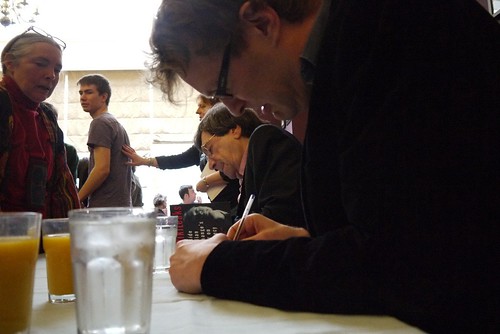Thanks to Chris High for pointing me to it.
Larry Page: saying FU to Wall Street
Refreshing rant by Henry Blodget.
Wall Street has reacted to the first quarter in the Page regime by tossing the stock overboard. Larry Page is spending way too much, Wall Street says. Larry Page isn’t communicating well enough. Larry Page couldn’t even be bothered to spend more than a couple of minutes on the earnings call with Wall Street last night. So to hell with him!
Lost under the outrage, of course, is that Larry Page may be doing exactly the right thing: Focusing on Google and Google’s products and users, instead of Wall Street.
Wall Street loves to be made to feel that there is nothing that matters more to a CEO than Wall Street. But Wall Street’s focus is relentlessly short-term: Wall Street cares about this quarter and next quarter, not the next 10 years. And although short-term performance certainly provides an indication about where a company is headed, for the long-term value of the company itself, it’s nearly irrelevant.
If Google is to wrest back the mantle of innovation leadership from Apple and Facebook, it needs to focus on the long term. It needs to revitalize the culture of innovation that defined the company in the beginning. It needs to make big, bold bets that cost a lot of money. And it needs to address its biggest weaknesses. In short, it needs to do exactly what Larry Page and Sergey Brin said Google would do when it went public seven years go: Focus on the long-term, not the short term, and make decisions that won’t make short-term investors happy.
Yep. All of which confirms the wisdom of the decision the Google boys made before their IPO — to have two kinds of share, much as the Sulzbergers set up the stock structure of the NY Times. The founders control the shares which decide the issues; and, in the end, Wall Street can get stuffed.
Google and the coming war
Fascinating — and perceptive — Forbes column by Ben Horowitz, the big-time venture capitalist, on what the changes at the top of Google really signify.
Recently, Eric Schmidt stepped down as CEO of Google and founder Larry Page took over. Much of the news coverage focused on Page’s ability to be the “face of Google” as Page is far more shy and introverted than the gregarious and articulate Schmidt. While an interesting issue, this analysis misses the main point. Eric Schmidt was much more than Google’s front man; as Google’s peacetime Chief Executive, he led the greatest technology business expansion in the last ten years. Larry Page, in contrast, seems to have determined that Google is moving into war and he clearly intends to be a wartime CEO. This will be a profound change for Google and the entire high-tech industry.
This is a really interesting piece which, among other things, points out that most management textbooks are written for ‘peacetime’ CEOs. Worth reading in full.
News-U-Like
This morning’s Observer column.
Way back in 1996, the distinguished American journalist James Fallows published Breaking the News: How the Media Undermine American Democracy
, a remarkable study of the pernicious effects of broadcast television on democracy.
Among the phenomena he examined were the relentless trivialisation implicit in soundbite politics, the obsessive insistence that every political issue – no matter how complex – has only two sides and the tendency to treat every political controversy as if it were a football game and every election a horse race. But, en passant, Fallows also highlighted an equally disturbing trend – towards market-driven news: that is, news agendas that are driven not by some professional assessment of what's important and relevant, but by research into what viewers like and respond to. Put crudely, such an approach leads to news programming that plays down politics and economics in favour of coverage of crime, celebrity and sport. News-U-Like, as it were.
Earlier this month, Fallows decided to revisit this territory by embarking on a study of contemporary online news media…
The WikiLeaks boys
Luke Harding (foreground) and David Leigh signing copies of their book about WikiLeaks after speaking at the Cambridge Wordfest today.
The ‘End of History’ Man — on photography
A story about associative linking that would make Ol’ Vannevar Bush proud.
I’ve been reading reviews of Francis Fukuyama’s new book The Origins of Political Order: From Prehuman Times to the French Revolution and wondering whether to buy it. It looks interesting. And then I came on a Newsweek photo essay about him which included an intriguing photograph of him with his camera case. That’s when I discovered that he was a serious photographer, so of course I then went looking for his pictures, but before I got to any I found this essay by him on WSJ.com.
Let’s begin with how photography has changed. Ansel Adams’s iconic images of the Sierras were taken with an 8-inch-by-10-inch view camera, a wooden contraption with bellows in which the photographer saw his subject upside-down and reversed under a black cloth. Joel Meyerowitz’s stunning photographs of Cape Cod were taken with a similar mahogany Deardorff view camera manufactured in the 1930s. These cameras produce negatives that contain up to 100 times the amount of information produced by a contemporary top-of-the-line digital SLR like a Canon EOS 5D or a Nikon D3. View cameras allow photographers to shift and tilt the lens relative to the film plane, which is why they continue to be used by architectural photographers who want to avoid photos of buildings with the converging vertical lines caused by the upward tilt of the lens on a normal camera. And their lenses can be stopped down to f/64 or even f/96, which allows everything to be in crystalline focus from 3 inches away to infinity. (Ansel Adams, Edward Weston and Imogen Cunningham were part of a group called “f/64” in celebration of this characteristic.)
Perhaps the most important feature of these older film cameras was their lack of convenience. They had to be mounted on tripods; it took many minutes to shoot a single frame; and they were hardly inconspicuous. In contrast to contemporary digital photographers who snap a zillion photos of the same subject and hope that one will turn out well composed, view camera photography is a more painterly activity that forces the photographer to slow down and think ahead carefully about subject, light, framing, time of day, and the like. These skills are in short supply among digital photographers.
Older cameras were far better built. A few years ago I was given a Leica M3 once owned by my uncle, who joined the U.S. Army to get out of an internment camp for Japanese-Americans during World War II. He was sent to Germany where he acquired the Leica around the time I was born. This camera, with its f/2 Summicron, a classic, fast, tack-sharp lens, still takes beautiful pictures. How many digital cameras will still be functioning five years from now, much less 50? Where are you going to buy new batteries and the media to store your photos in 2061?
Where indeed? It turns out that Fukuyama is also an audio buff with strong views on the capacity of MP3 compression to ruin audio quality.
And of course I had to check out what a GigiPan Epic 100 would cost. Answer: £414 on eBAY.
Anyone for tennis?
The Windsor-Middleton merger: is anybody interested?
Lovely quote from the Economist.
I HAVE yet to come upon anybody in Britain who is remotely interested in the impending royal wedding, let alone excited by it, and I pride myself on the range of people I talk to. The newspapers keep trying to drum up some excitement (The frocks! The double-barrelled guest lists! The first commoner to marry a royal!), and the great British public responds with a yawn and a scratch.
The French had to resort to the guillotine to get rid of their royal family; perhaps ours will simply expire through lack of interest.
Personally, I hope to be out of the country on the day.
Steven Levy on Google
Here’s an interesting interview with Steven Levy, who has a new book about Google. Sigh: another one for the ‘must read’ pile.



